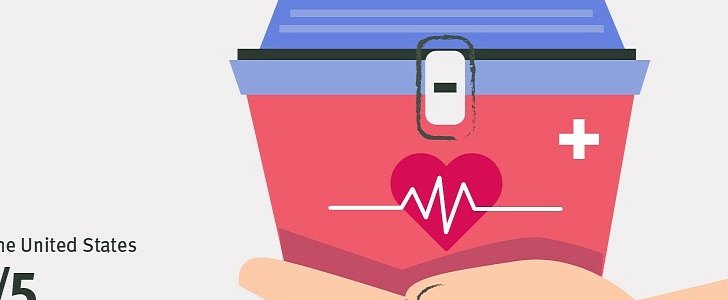As the world is heading towards a driverless future, analysts have already started crunching numbers and making studies to estimate the impact a driverless fleet of cars will have.
Many of the effects will be positive: there will be a decrease in the number of fatalities from car crashes, there will be no need for parking places anymore, congestion will be significantly reduced and urban mobility will shift towards a more functional approach.
However, according to data from Select Car Leasing, switching to driverless cars will also translate into a massive organ crisis. With fewer victims in crashes, there will be less donors to harvest organs from.
“20% of the organs currently donated for transplant come from driving accidents. Once driverless cars are implemented, its predicted that they will lead to a 90% decrease in road accidents meaning there will be fewer organs available for people who need them,” the company says.
There is a bright side, though. Road rage incidents will decrease and, with it, there will be fewer victims from accidents caused by road rage and the levels of stress in drivers will go down. That last part makes complete sense, since there will be no more drivers to speak of. In turn, this will positively impact each country’s national health system, meaning smaller costs.
At the same time, there will be fewer accidents since driverless cars will obey the law to the T. The number of alcohol-related accidents will also go down, but alcohol consumption overall will probably register a spike, since there will be nothing to prevent you from knocking back a few before getting inside a car.
Children could travel alone in a driveless car. UK’s Transport Minister Claire Perry recently said, “‘I have a vision of the school-run driverless car where you wave your children off to school and they come back at 3.30.” Whether adults will actually trust their child’s life with a driverless car remains to be seen.
There will be fewer owners of cars and fewer cars will be made, since demand will drop. Driverless cars will probably be introduced on a subscription model, with the possibility to hail them from any location. In turn, this will mean thousands of jobs in the automotive industry getting cut.
Last but not least, the era of the driverless car will probably mean the end of the radio as we know it. Passengers will turn to their smartphones and other devices for more engaging content, now that they’re not forced to look at the road anymore.
However, according to data from Select Car Leasing, switching to driverless cars will also translate into a massive organ crisis. With fewer victims in crashes, there will be less donors to harvest organs from.
“20% of the organs currently donated for transplant come from driving accidents. Once driverless cars are implemented, its predicted that they will lead to a 90% decrease in road accidents meaning there will be fewer organs available for people who need them,” the company says.
There is a bright side, though. Road rage incidents will decrease and, with it, there will be fewer victims from accidents caused by road rage and the levels of stress in drivers will go down. That last part makes complete sense, since there will be no more drivers to speak of. In turn, this will positively impact each country’s national health system, meaning smaller costs.
At the same time, there will be fewer accidents since driverless cars will obey the law to the T. The number of alcohol-related accidents will also go down, but alcohol consumption overall will probably register a spike, since there will be nothing to prevent you from knocking back a few before getting inside a car.
Children could travel alone in a driveless car. UK’s Transport Minister Claire Perry recently said, “‘I have a vision of the school-run driverless car where you wave your children off to school and they come back at 3.30.” Whether adults will actually trust their child’s life with a driverless car remains to be seen.
There will be fewer owners of cars and fewer cars will be made, since demand will drop. Driverless cars will probably be introduced on a subscription model, with the possibility to hail them from any location. In turn, this will mean thousands of jobs in the automotive industry getting cut.
Last but not least, the era of the driverless car will probably mean the end of the radio as we know it. Passengers will turn to their smartphones and other devices for more engaging content, now that they’re not forced to look at the road anymore.




